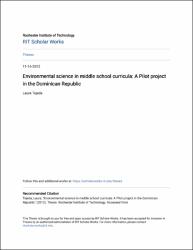/admin/item?itemID=cc3f578d-1571-4905-8322-e671102904a1
Environmental science in middle school curricula : A pilot project in the Dominican Republic

View/
Type of Access
OpenMaterial Type
TextType of Content
ThesisLanguage
EnglishCollection
- Investigación ambiental [1758]
Metadata
Show full item record| Abstract: | The Dominican Republic’s (DR) public investment in education by 2010 was 2% of the GNP; falling behind the 6% minimum established by UNESCO in 2010 as a requirement to achieve quality education. The DR has not developed an Environmental Education policy. The DR’s Environment Law 64-00 dictates Environmental Education to be introduced as one of the cross-cutting themes called “transverse axis” into the general curricula of all schools. However, due to lack of time and teachers able to integrate these axes into lesson plans, they were seldom implemented. This pilot project took place at The Community for Learning School (TCFL). Their 5th – 8th grade science curricula were enhanced with four activities (Composting, School Garden, Garbage Project and Energy Audit) designed to connect with current themes in the school year 2011-2012. Assessing students’ knowledge gain with pre and post-tests data, assessing changes in attitude towards the activities and assessing changes in behavior post implementation were the evaluations used. In the quantitative analyses, codified data helped built 95% Confidence Intervals, Chi-Square tests of association, clustered bar-graphs and Nonparametric (Mann-Whitney) tests for small samples. For the qualitative analyses, students, staff and teachers were interviewed through focus groups. The school garden and the composting project improved students’ motivation towards group work and left a positive perception of these environmentally friendly practices. Positive change in attitude was perceived among the participants; however, the knowledge gain about the environmental benefits of both activities was not as expected. Throughout the focus group sessions, an increase in environmental awareness was recorded for all activities to some degree. However, for the garbage project and the energy audit, only minor behavioral and attitude changes were perceived. Overall, all activities were considered positive for the school and the grade levels. Teachers, staff and students agreed that they should be continued. |
| Author(s): | Tejeda, Laura
|
| Date: | 2012 |
| Published: | Rochester, NY: Rochester Institute of Technology |
| Citation: | Tejeda, L. (2013). Environmental science in middle school curricula: A pilot project in the Dominican Republic (Master thesis). Rochester Institute of Technology. Recuperado de: |
| URI: | https://bvearmb.do/handle/123456789/3798
|

